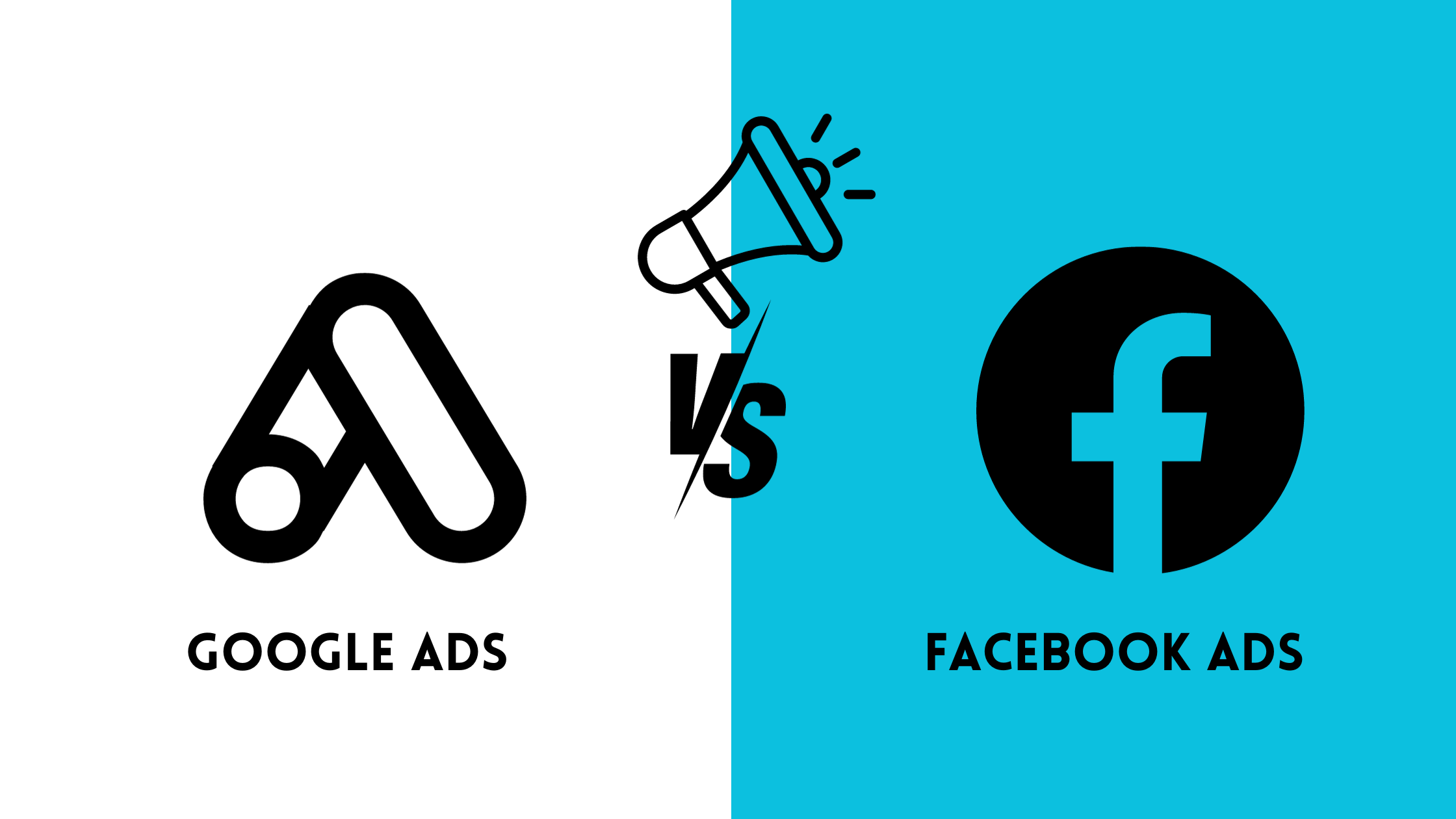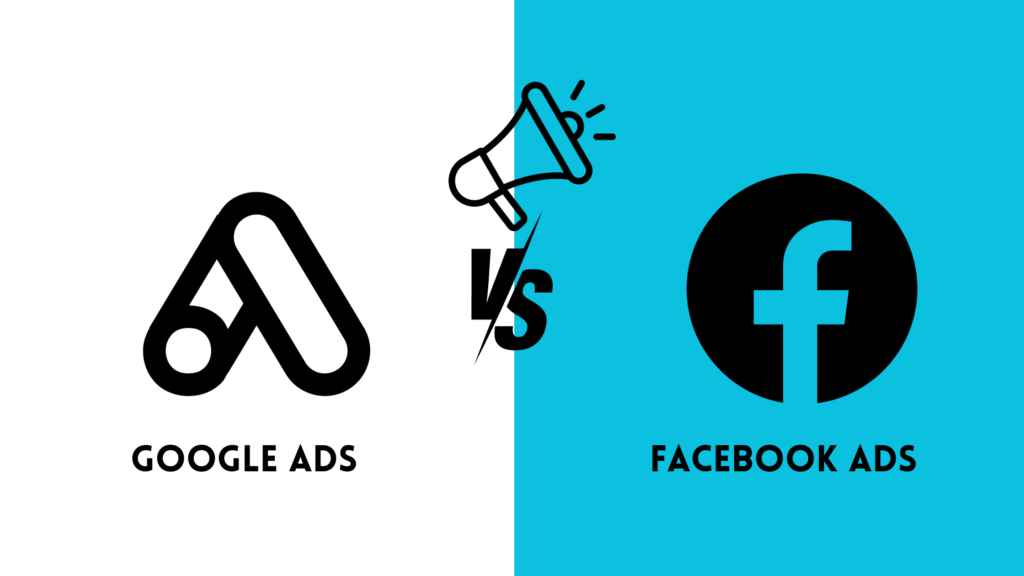
What are the differences between Google Ads vs Facebook ads?

difference between Google Ads and Facebook ads?
Introduction : Google ads vs Facebook Ads-
In today’s digital age, advertising is a crucial component of any successful marketing strategy. Two of the most popular advertising platforms are Google Ads vs Facebook Ads. While they both serve the same fundamental purpose – helping businesses reach their target audience – they do so in different ways. In this blog, we’ll break down the key differences between Google Ads and Facebook Ads in easy-to-understand language, helping you decide which platform is right for your marketing goals.
1. Intent vs. Social Engagement Google Ads vs Facebook Ads

Google Ads:
Google Ads primarily leverages the power of search intent. When users type in a search query, they often have a specific goal in mind, whether it’s finding information, making a purchase, or solving a problem. Google Ads displays text and image-based ads in search results, YouTube videos, and across the Google Display Network to meet these intent-driven needs.
Facebook Ads:
Facebook Ads, on the other hand, thrive on social engagement. Advertisers can target users based on their demographics, interests, and behaviors. Facebook Ads aim to capture users’ attention while they browse their feeds, promoting products or services through images, videos, and carousel ads.
2. Ad Formats
Google Ads:
Google offers a variety of ad formats, including Search Ads (text-based ads that appear in search results), Display Ads (image and text-based ads on websites within the Google Display Network), Video Ads (short video clips on YouTube and partner sites), Shopping Ads (product listings with images), and App Ads (promoting mobile apps).
Facebook Ads:
Facebook provides an array of ad formats too, such as Image Ads (single images), Video Ads (short videos), Carousel Ads (scrollable image or video galleries), Slideshow Ads (a series of images or videos), and Story Ads (full-screen ads in the Stories feed).
3. Targeting Options Google ads vs facebook ads
Google Ads:
Google Ads offers precise targeting options based on keywords, location, device, language, and demographics. It also allows for remarketing, where you can target users who have previously interacted with your website or app.
Facebook Ads:
Facebook’s targeting is all about audience segmentation. You can target users based on their age, gender, interests, behaviors, and even connections (e.g., friends of people who like your page). This makes it great for brand awareness and reaching a specific demographic.
4. Cost Structure
Google Ads operates on a pay-per-click (PPC) or cost-per-click (CPC) model, meaning you pay when someone clicks on your ad. The cost can vary widely depending on competition for keywords.
Facebook Ads typically use a cost-per-thousand impressions (CPM) or cost-per-Mille model, where you pay for every thousand impressions your ad receives. You can also choose a cost-per-click (CPC) or cost-per-action (CPA) bidding strategy for more control over your spending.
5. Ad Placement
Google Ads can appear on the Google Search Network (search results), Google Display Network (websites that partner with Google), YouTube, and mobile apps (via AdMob).
Facebook Ads are displayed on the Facebook platform itself, as well as on Instagram (which is owned by Facebook). They can also be shown on Audience Network (third-party apps and websites that partner with Facebook).
6. Tracking and Analytics
Google offers robust tracking tools like Google Analytics, which provides in-depth insights into user behavior, conversion tracking, and more.
Facebook’s ad manager provides detailed analytics on ad performance, including reach, engagement, and conversion metrics.
Strengths and Advantages of Google Ads:
1. High Intent Audience:
Google Ads target users actively searching for specific information or products, making it an ideal platform for businesses looking to capture leads and conversions.
2. Keyword Targeting:
With keyword targeting, you can match your ads to users’ search queries, ensuring your content is highly relevant to their needs.
3. Flexible Budgeting:
Google Ads allows for precise control over your budget, making it suitable for businesses of all sizes.
4. Remarketing:
You can re-engage past visitors to your website with remarketing campaigns, increasing the likelihood of conversions.
5. Comprehensive Analytics:
Google offers robust tracking and analytics tools, such as Google Analytics, to measure the impact of your ads and optimize campaigns.
6. Variety of Ad Formats:
Google Ads provides a wide range of ad formats, ensuring you can tailor your ads to different platforms and user preferences.
Strengths and Advantages of Facebook Ads:
1.Extensive Audience Targeting:
Facebook’s audience segmentation options allow for highly specific targeting based on demographics, interests, and behaviors, helping you reach the right people.
2. Visual Appeal:
Facebook Ads leverage visually engaging content, such as images and videos, which can capture users’ attention in their news feeds.
3. Brand Awareness:
Facebook is an excellent platform for building brand awareness and fostering engagement with your audience.
4. Engagement Metrics:
You can track likes, comments, shares, and other engagement metrics, providing valuable feedback on your content’s resonance with your audience.
5. A/B Testing:
Facebook Ads Manager lets you easily run A/B tests to optimize your ad campaigns and improve their performance.
6. Mobile Advertising:
With the majority of Facebook users accessing the platform on mobile devices, Facebook Ads are a great way to reach a mobile audience.
7. Integration with Instagram: Google ads vs facebook ads
Facebook Ads Manager also add allows you to advertise on Instagram,
The choice between Google Ads and Facebook Ads depends on your specific marketing objectives and target audience. Google Ads are best suited for capturing users with high intent, while Facebook Ads are excellent for audience segmentation, engagement, and brand building. Many businesses find success by combining both platforms to create a well-rounded digital marketing strategy that leverages the strengths of each.



